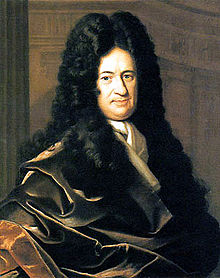Gottfried Leibniz
Gottfried Wilhelm Leibniz | |
|---|---|
 | |
| Born | 1 July 1646 Leipzig, Electorate of Saxony |
| Died | 14 November 1716 (aged 70) |
| Era | 17th-century philosophy |
| Region | Western Philosophy |
| Doctoral advisor | Erhard Weigel |
| Doctoral students | Jacob Bernoulli Christian von Wolff |
Main interests | Metaphysics, Mathematics, Theodicy |
Notable ideas | Infinitesimal calculus, Monadology, Theodicy, Optimism Leibniz formula for pi Leibniz harmonic triangle Leibniz formula for determinants Leibniz integral rule Principle of sufficient reason Diagrammatic reasoning Notation for differentiation Proof of Fermat's little theorem Kinetic energy Entscheidungsproblem |
Influences
| |
| Signature | |
 | |
Gottfried Wilhelm Leibniz (also Leibnitz or von Leibniz)[1] 1 July 1 (21 June OS) 1646 – 14 November 1716) was a German intellectual who wrote mostly in French and Latin. He played an important role in both philosophy and mathematics. He invented calculus independently of Newton, and his notation for derivatives is the one in general use since then.[2] He also invented the binary system, foundation of modern computers.
Works
[change | change source]He was taught law and philosophy. He served as secretary to two major German noble houses: one became the British royal family while he served it. Leibniz played a major role in the European politics and diplomacy of his day.
Philosophy
[change | change source]In philosophy, he is most remembered for optimism. He thought our universe is the best possible one God could have made. He was one of the great 17th century rationalists. René Descartes and Baruch Spinoza are the other two. His philosophy also both looks back to the Scholastic tradition and anticipates modern logic and analysis.[3]
Technology
[change | change source]Leibniz also made contributions to physics and technology, and anticipated ideas which surfaced much later in biology, medicine, geology, probability theory, psychology, and information science. He wrote on politics, law, ethics, theology, history, and philology. Sometimes, he even wrote in verse. His contributions are scattered in journals and in tens of thousands of letters and unpublished manuscripts. There is no complete edition of Leibniz's writings, and a complete account of his accomplishments is not yet possible. Leibniz is sometimes known as the last "universal genius".[4] Leibniz is perhaps most famous for his involvement in development of calculus independent of Isaac Newton and creation of Leibniz Notation which is the standard form of calculus today.
Related pages
[change | change source]References
[change | change source]- ↑ IPA pronunciation: /'laɪpnɪts/.
- ↑ "List of Calculus and Analysis Symbols". Math Vault. 2020-05-11. Retrieved 2020-10-14.
- ↑ Copleston, Frederick C. 1958. The history of philosophy, Vol. IV: Modern philosophy: from Descartes to Leibniz. London: Burns, Oates & Washbourne.
- ↑ Look, Brandon C. (2020). Zalta, Edward N. (ed.). The Stanford Encyclopedia of Philosophy (Spring 2020 ed.). Metaphysics Research Lab, Stanford University.
More reading
[change | change source]- Sepioł, Zbigniew (2003). "Legal and political thought of Gottfried Wilhelm Leibniz". Studia Iuridica (in Polish). 41: 227–250. ISSN 0137-4346.
| International | |
|---|---|
| National | |
| Academics | |
| Artists | |
| People | |
| Other | |
Text is available under the CC BY-SA 4.0 license; additional terms may apply.
Images, videos and audio are available under their respective licenses.
